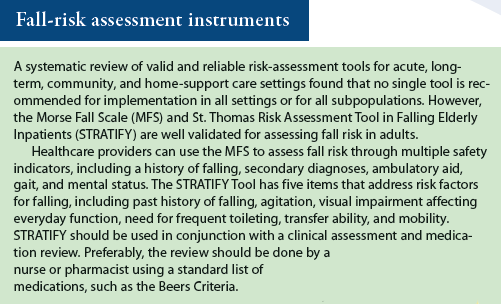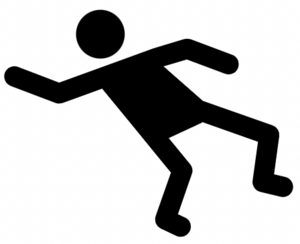A Biased View of Dementia Fall Risk
A Biased View of Dementia Fall Risk
Blog Article
What Does Dementia Fall Risk Mean?
Table of ContentsSee This Report on Dementia Fall RiskUnknown Facts About Dementia Fall RiskThe 30-Second Trick For Dementia Fall RiskThe smart Trick of Dementia Fall Risk That Nobody is DiscussingSome Of Dementia Fall Risk
Analyzing loss threat aids the whole healthcare group create a safer atmosphere for each and every patient. Ensure that there is a marked location in your medical charting system where staff can document/reference scores and document appropriate notes connected to fall prevention. The Johns Hopkins Loss Risk Analysis Tool is among lots of tools your personnel can use to aid protect against damaging medical events.Individual falls in medical facilities prevail and devastating unfavorable occasions that linger despite years of effort to decrease them. Improving communication throughout the evaluating registered nurse, care team, individual, and client's most entailed family and friends might strengthen autumn prevention efforts. A group at Brigham and Women's Medical facility in Boston, Massachusetts, looked for to develop a standard loss prevention program that focused around improved communication and patient and family members engagement.

The innovation team stressed that successful execution depends upon individual and staff buy-in, combination of the program right into existing workflows, and integrity to program processes. The team kept in mind that they are facing exactly how to make certain continuity in program execution during durations of crisis. During the COVID-19 pandemic, as an example, an increase in inpatient falls was linked with restrictions in person engagement together with constraints on visitation.
Examine This Report on Dementia Fall Risk
These events are commonly considered avoidable. To implement the intervention, organizations need the following: Access to Autumn suggestions resources Autumn suggestions training and retraining for nursing and non-nursing staff, consisting of brand-new registered nurses Nursing operations that enable individual and household interaction to conduct the falls analysis, make certain usage of the avoidance plan, and conduct patient-level audits.
The results can be extremely harmful, typically accelerating patient decrease and creating longer health center stays. One study approximated remains enhanced an additional 12 in-patient days after a patient loss. The Loss TIPS Program is based upon appealing clients and their family/loved ones across 3 primary processes: analysis, customized preventative interventions, and auditing to make certain that patients are participated in the three-step loss avoidance process.
The person evaluation is based on the Morse Autumn Scale, which is a verified fall threat evaluation device for in-patient health center settings. The range includes the six most common factors patients in hospitals drop: the patient loss background, high-risk problems (including polypharmacy), use IVs and other outside devices, mental condition, gait, and mobility.
Each threat element relate to several workable evidence-based interventions. The registered nurse creates a plan that includes the interventions and shows up to the Recommended Site treatment team, patient, and household on a laminated poster or published visual aid. Registered nurses establish the plan while consulting with the individual and the client's family.
The Definitive Guide to Dementia Fall Risk
The poster serves as a communication tool with various other participants of the person's treatment team. Dementia Fall Risk. The audit element of the program includes examining the individual's understanding of their danger elements and avoidance plan at the system and healthcare facility degrees. Nurse champions conduct at the very least 5 private interviews a month with clients and their families to look for understanding of the fall avoidance plan

A projected 30% of these falls lead to injuries, which can vary in seriousness. Unlike other adverse events that require a standard professional feedback, fall avoidance depends very on the requirements of the individual. Including the input of individuals that understand the patient best permits for higher customization. This approach has actually shown to be more reliable than loss avoidance programs that are based mainly on the production of a threat score and/or are not personalized.
The Buzz on Dementia Fall Risk

Based on bookkeeping outcomes, one site had 86% conformity and 2 sites had over 95% conformity. A cost-benefit evaluation of the Fall ideas program in eight healthcare facilities approximated that the program cost $0.88 per individual to carry out and caused cost savings of $8,500 per 1000 patient-days in straight prices related to the prevention of 567 drops over three years and 8 months.
According to the innovation team, organizations curious about implementing the program ought to carry out a preparedness evaluation and falls prevention spaces evaluation. 8 In addition, organizations need to ensure the needed infrastructure and workflows for application and establish an go to the website execution strategy. If one exists, the company's Fall Prevention Job Pressure need to be involved in planning.
The Dementia Fall Risk Statements
To begin, organizations should ensure conclusion of training modules by registered nurses and nursing aides - Dementia Fall Risk. Health center personnel need to analyze, based upon the demands of a hospital, whether to make use of a digital health and wellness record hard copy or paper variation of the autumn prevention strategy. Carrying out teams need to hire and train registered nurse champions and develop procedures for auditing and reporting on fall data
Team need to be associated with the procedure of upgrading the process to engage people and household in the assessment and avoidance plan procedure. Systems should remain in location so that systems can understand why a loss occurred and remediate the reason. Much more specifically, registered nurses must have networks to offer recurring comments to both team and system management so they can adjust and improve loss prevention operations and communicate systemic issues.
Report this page